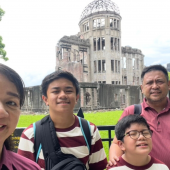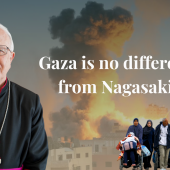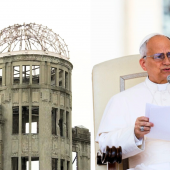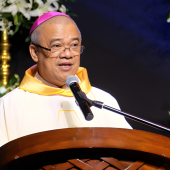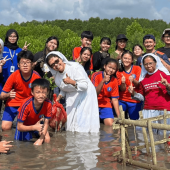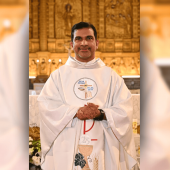U.S. Bishops Join Japanese Counterparts for Pilgrimage of Peace Marking 80 Years Since Hiroshima, Nagasaki Bombings
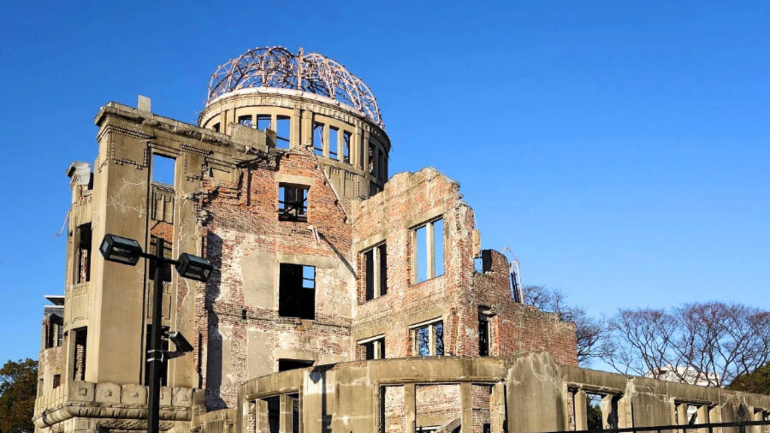
As the world marks 80 years since the atomic bombings of Hiroshima and Nagasaki, Catholic bishops from the United States are joining their counterparts in Japan for a "Pilgrimage of Peace", a powerful sign of transnational solidarity amid rising nuclear tensions.
Cardinal Blase J. Cupich of Chicago, Cardinal Robert W. McElroy of Washington, Archbishop Paul D. Etienne of Seattle, and Archbishop John C. Wester of Santa Fe are among those traveling to Japan from August 5 to 10. They will participate in interfaith prayer services, public commemorations, and liturgical celebrations in Hiroshima and Nagasaki, cities forever etched into the global memory of war and destruction.
According to a report published by The Catholic Register, students, faculty, and staff from Catholic universities such as Nagasaki Junshin Catholic University, Sophia University (Tokyo), Georgetown University, Loyola University Chicago, and the University of Notre Dame will also take part. The Association of Jesuit Colleges and Universities in North America is a key partner in the effort. The pilgrims will be welcomed and accompanied by Archbishop Peter Michiaki Nakamura of Nagasaki and Bishop Alexis Mitsuru Shirahama of Hiroshima.
This is the third time Archbishop Wester has joined the pilgrimage. A longtime advocate for nuclear disarmament, he released a pastoral letter in 2022 titled "Living in the Light of Christ’s Peace," calling for moral and political commitment to the abolition of nuclear weapons. His Archdiocese of Santa Fe is home to the Los Alamos and Sandia National Laboratories, both central to the U.S. nuclear weapons program.
The Catholic Register also reported on Archbishop Wester’s participation in a July 16 interfaith prayer service held at the Trinity Site in New Mexico, where the first-ever atomic test took place in 1945. That test unleashed long-term environmental and health consequences for nearby residents, now known as the “Downwinders.”
From an Asian perspective, the pilgrimage resonates deeply, not only with the enduring suffering of Japan but also with the moral leadership of its survivors, known as hibakusha. Masako Wado, assistant secretary general of Nihon Hidankyo, the Japanese hibakusha group recently awarded the 2024 Nobel Peace Prize, delivered a video message during a related U.S. event, warning that “the risk of using nuclear weapons has never been higher than it is now.”
Wado’s words echo a shared concern among Asian peace advocates who view the legacy of Hiroshima and Nagasaki as a moral warning to the world. The continuing threat of nuclear warfare, including in Asia-Pacific flashpoints, underscores the urgency of disarmament.
In his July 23 column for Chicago Catholic (quoted by The Catholic Register), Cardinal Cupich invoked the words of U.S. Gen. Omar Bradley, who said in 1949 that America had “won a war and lost a peace.” Cupich stressed that democratic societies must reject any rationale that legitimizes the mass killing of civilians, even in the name of military victory.
He cited sobering data from a 2017 study by scholars Scott Sagan and Benjamin Valentino, showing that a majority of Americans would still support the use of nuclear weapons if they believed it would save U.S. lives, a mindset the Church must challenge, Cupich said, by cultivating “an ethic of solidarity” and a “commitment to peace-building.”
The pilgrimage is not only a remembrance of the past but also a declaration for the future. In a July 22 press release, Archbishop Wester said, “We are pilgrims of peace and hope, crossing continents and histories to remember the past and transform the future.”
As Asian communities continue to grapple with the consequences of war, colonization, and militarization, such cross-continental efforts toward nuclear disarmament are a sign of hope, and a call to action, for peace rooted in justice, memory, and global solidarity.
Radio Veritas Asia (RVA), a media platform of the Catholic Church, aims to share Christ. RVA started in 1969 as a continental Catholic radio station to serve Asian countries in their respective local language, thus earning the tag “the Voice of Asian Christianity.” Responding to the emerging context, RVA embraced media platforms to connect with the global Asian audience via its 21 language websites and various social media platforms.









